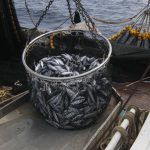MacMullen told that consumers need clear guidance to help them make responsible choices when buying seafood. As the demand of sustainable fish rising good and clear labelling has become a very important part of this process in the future but traceability is still far from perfect as far as consumers are concerned. Seafish said that it is genuinely difficult to be sure of all the details of any given fish supply line. It also states that to this extent advice given via lists such as this one must match the reality of the available information.
According to MacMullan the complexities of fisheries also mean that it is difficult to rely on a simple eat/avoid list. Fish stocks are dynamic and can change their status quite quickly. Seafish is pleased to see that this edition of the MCS list has broken down some species to reflect the dynamics of fish stocks, and that more stocks have been removed from the “avoid” list than added to it. MacMullan told that this new list now provides quite a detailed and complex analysis but still contains a number of errors.
MacMullan explained that those looking for seafood subject to extra sustainability criteria can already purchase from retailers with their own published seafood sourcing policies or who use Responsible Fishing Scheme vessels, or choose Marine Stewardship Council-certified fisheries. Seafish leads the world in the development of responsible fishing methods, and it is as much in the industry’s interests as it is environmental common sense to see sustainable and well-managed fisheries all over the world.








